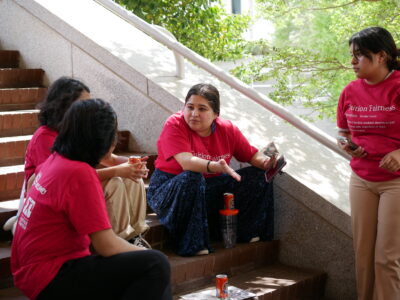
Share this story
|
|
As we cross the midway point for the legislative session in the North Carolina General Assembly, education continues to be the focal point of a number of bills that have been introduced in both the House and the Senate. Here is a look at all of the education bills filed in April alone.
At the forefront of the legislation introduced this session is a concerted effort to expand school choice, posing a threat to public school funding and enrollment. That threat grew when the political dynamics of the General Assembly shifted to give Republicans a supermajority, following Rep. Tricia Cotham’s, R-Mecklenburg, decision to switch parties in early April.
Since the start of the legislative session, and especially following Cotham’s party change, various groups have gathered at the steps of the legislature to make sure those in positions of power hear their concerns and demands with regards to public education. By voicing their opinions through rallies, in-person lobbying, and even bringing in famous North Carolinians to help advocate, they hope to sway legislators to vote in their favor.
These instances of organized advocacy represent the range of stakeholders affected by education legislation and the public commitment to supporting our state’s students in all stages of their educational careers.
Advocacy from birth to kindergarten
Advocacy efforts taking place in our state’s capital have not been limited to the K-12 education spectrum. Activists have also been demanding recognition for the role maternal and neonatal care as well as early childhood education play in the future success of our state’s students.
Below are just a few examples of the groups hoping to shed light on these issues this legislative session.
Protecting Black mothers and children
April 11-17 marked Black Maternal Health Week, during which advocates and health care professionals from across the state gathered at Guilford Technical Community College for the first ever Black Maternal & Infant Health Conference, hosted by the Black Pearl Society.
Black women are three times more likely to die during childbirth due to ingrained social and structural biases in our nation’s health care system.
The objectives of the two-day event included:
- Explore the impacts of public health policy and interventions on Black maternal and infant health in North Carolina.
- Discuss the importance of using a Reproductive Justice framework when considering Social Determinants of Health.
- Review maternal health statistics in North Carolina and analyze the role played by midwives and doulas in overall health outcomes.
- Engage with members of the Black Maternal Health Project and learn how their projects work to decrease the maternal morbidity and mortality crisis.
- Identify and network with community organizations researching maternal health in North Carolina with the purpose of improving overall health outcomes and decreasing pregnancy complications for all women and birthing people.
The Black Pearl Society hopes to make the conference an annual event.
Early childhood education
On April 20, early childhood educators, child care service owners and directors, parents, and advocates marched and met with legislators at the General Assembly to urge them to double the state’s early childhood funding.
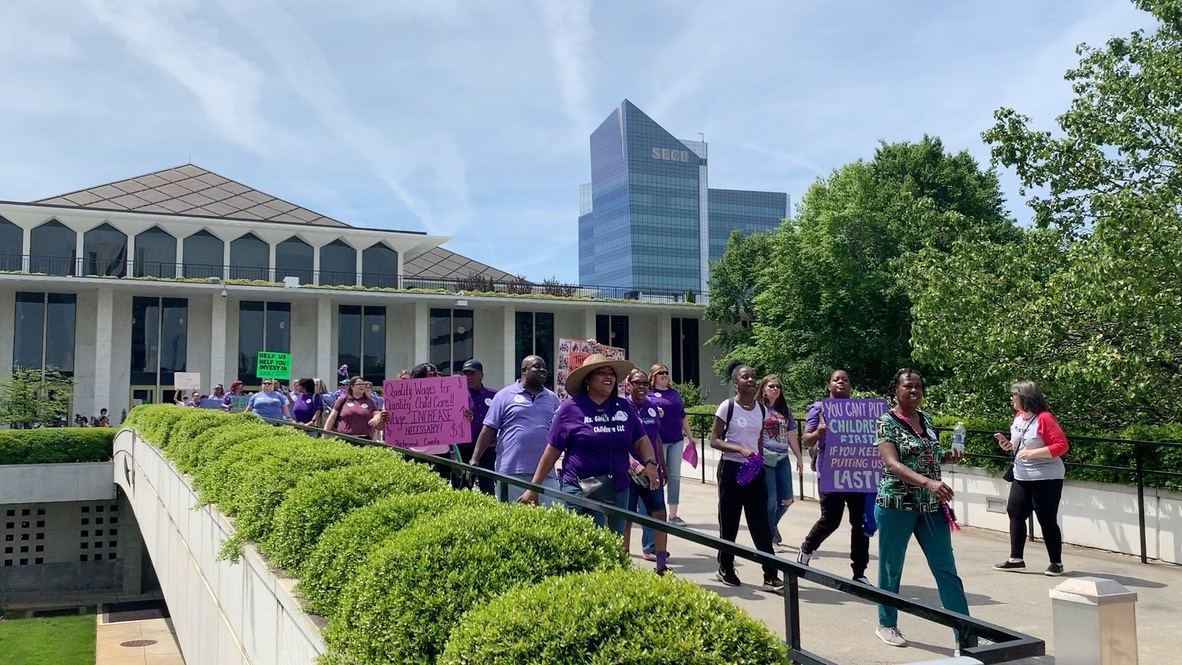
Child care workers in North Carolina received a median hourly wage of $11.23 in 2021, according to the Bureau of Labor Statistics. Directors, whose budgets primarily go to salaries, are often unable to raise tuition rates without pricing out parents. Meanwhile, parents of young children often cite child care as their biggest expense.
The priority of many advocates and early childhood caucus members this session is $300 million in compensation grants to help providers retain teachers as pandemic-related federal relief funds dry up this year.
The NC Early Education Coalition called the House budget proposal released in early April disappointing, as it did not enhance funding for child care programs or extend stabilization funding from the pandemic.
Next, the Senate will propose a budget. It is unclear how much funding, if any, will make it in the final budget to extend these grants.
K-12 education policy advocacy
Though education advocacy in our state’s capital has represented issues across the continuum from a child’s birth to their postsecondary education, many of the bills being filed this legislative session directly impact students’ K-12 experiences. For that reason, there have been ample efforts to turn legislators’ attention to the factors that matter most for K-12 student success.
Arts education
On April 17-18, ArtsNC, a nonprofit arts advocacy organization, hosted ARTS Day, a two-day event convening artists and arts leaders from across the state in Raleigh to “meet with their elected representatives at the NC General Assembly (and) deliver a message about the ARTS that is simple, inclusive, and positive.”
You can find the 2023 legislative requests that were the focus of the ARTS Day advocacy efforts below.
Among ArtsNC’s requests is support for House Bill 136, which would grant high school students with 40 hours of arts credits a high school diploma seal, and support for House Bill 498, which would guarantee music and visual arts education for all K-5 students.
There is also a request for $1.5 million to fund A+ Schools of NC, an organization that supports schools where the arts are deemed integral to teaching and learning. State funding to the organization has been pledged to be matched by a private foundation.
ArtsNC is also requesting $3.5 million in recurring funding for NC Arts Council grants, which are awarded to public school arts programs across the state, in addition to local arts organizations and artists.
The ARTS Day event uplifted these legislative priorities through performances, networking, advocacy workshops, legislative updates, meetings with legislators, and more.

Ben Folds was among those present at the event, both as a performer and a speaker. As part of the event’s arts advocacy, he met with Superintendent Catherine Truitt and with legislators in the Joint Caucus on Arts and Arts Education.
He spoke to them all about the importance of arts education and specifically about his Key for Kids initiative, in which Folds partners with seven arts organizations around the state “to provide young people in North Carolina who express an interest in learning to play piano the access to appropriate lessons and instruments at little or no cost.”
“ARTS Day is more than a collection of speakers, performances, and meetings with lawmakers. It is the annual culmination of a movement. Arts North Carolina advances public funding and policy for arts and arts education at the local, state, and federal level. This event connects the statewide creative community with their legislators as well as with each other and is crucial to helping Arts North Carolina achieve its mission to unite people and communities to strengthen and celebrate a creative North Carolina.”
Nate McGaha, executive director of ArtsNC
Culturally responsive K-12 instruction
Regional Teachers of the Year, Ashtyn Berry and Keegan Storrs, are part of this year’s Education Policy Fellowship Program (EPFP), a 10-month professional development program for emerging leaders “designed to activate leaders for equity, and develop a diverse and collaborative community of strategic leaders for effective public policy.”
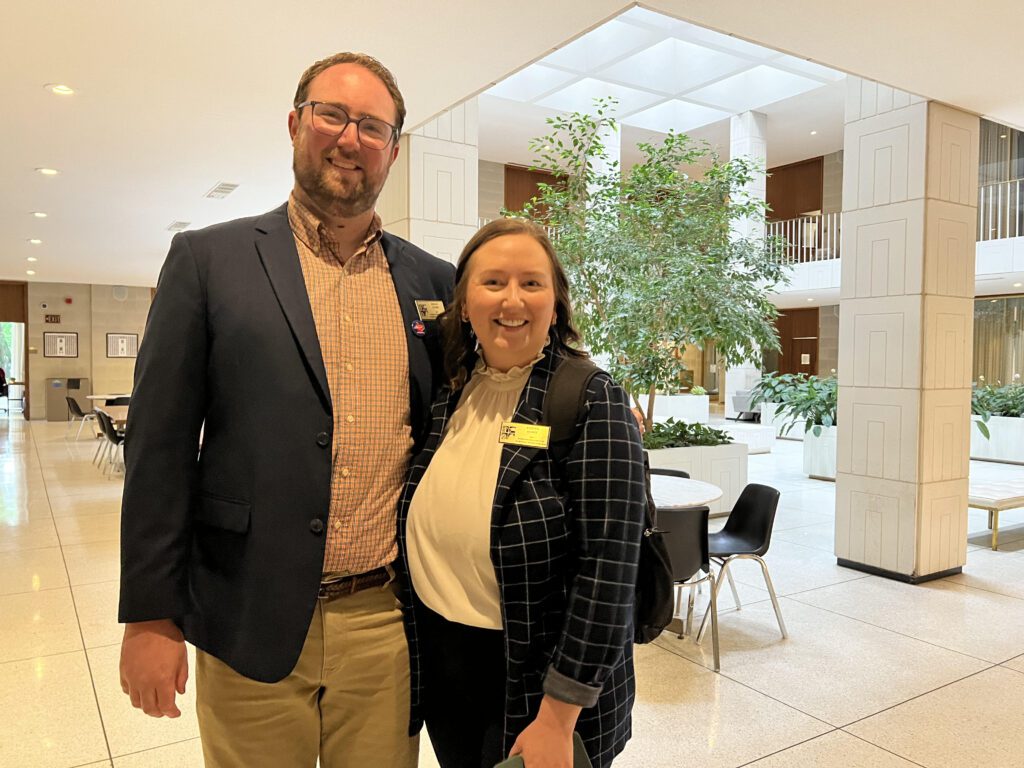

Berry, Storrs, and others have used what they have learned in the program to become better education advocates in the General Assembly.
This legislative session, House Bill 187 was introduced by Rep. Diane Wheatley, R-Cumberland. The bill would legislate “that students, teachers, administrators, and other school employees respect the dignity of others, acknowledge the right of others to express differing opinions, and foster and defend intellectual honesty, freedom of inquiry and instruction, and freedom of speech and association and that the public schools of North Carolina employ teaching methods and procedures to further that intent.”
The bill has passed the House and is currently in committee in the Senate. You can find the latest version of the bill below.
Since the bill’s filing, there has been criticism about its potential implications if passed. Teachers worry that the bill would impede upon their ability to offer culturally responsive teaching to their students. Culturally responsive teaching involves the acknowledgement of students’ cultural, ethnic, and racial identities in everyday classroom instruction as a means to empower students, especially students of color, and to bolster their academic success.
In response to HB 187, Berry and Storrs met with legislators to share their perspectives about what culturally responsive teaching looks like in practice and how it differs from common discourse surrounding Critical Race Theory (CRT).
“We’re not here with an ask today, just clearing up any confusion or misunderstanding,” Storrs said.
The Black and Brown Policy Network (BBPN) is using their voice to advocate against HB 187, which they characterize as an anti-CRT bill, and against other education bills with racial implications. Part of the organization’s mission is to “transform the state of the North Carolina Legislature and hold elected officials accountable to those they serve.” This legislative session, they have made public statements for or against a variety of education bills being introduced in the General Assembly.
In an official statement, BBPN said HB 187 “creates the harmful assumption that our underpaid and hardworking teachers promote beliefs through their teaching that would cause one race to hate another.”
Reach for the Stars! Be a star! STEM Fair
Joann Blumenfeld runs two programs out of N.C. State University’s Science House that seek to further postsecondary science, technology, engineering, and mathematics (STEM) opportunities for middle and high school students with disabilities. The two programs, Catalyst and Connecting Students with Autism to Geographic Information Systems and Technology (CSA-GIST), leverage unique talents that people with learning differences possess in order to set them up for college and career opportunities.
The Reach for the Stars! Be a Star! STEM Fair on April 22 was the first of its kind hosted by Blumenfeld, convening 733 people (including more than 400 students) from across the state. The event was an opportunity for students with disabilities “to learn about how to use their many abilities and talents to be part of a diverse, inclusive, and innovative STEM Workforce.”
Attendees engaged with the more than 50 employers present, including Lenovo, the U.S. Patent and Trademark Office, and Red Hat. They also met with elected officials like Gov. Roy Cooper, U.S. Rep. Wiley Nickel, D-N.C., and N.C. Rep. Frank Sossamon, R-Granville, and heard them speak about how important every student’s education is, how special every child’s potential is, and how bright their futures are.
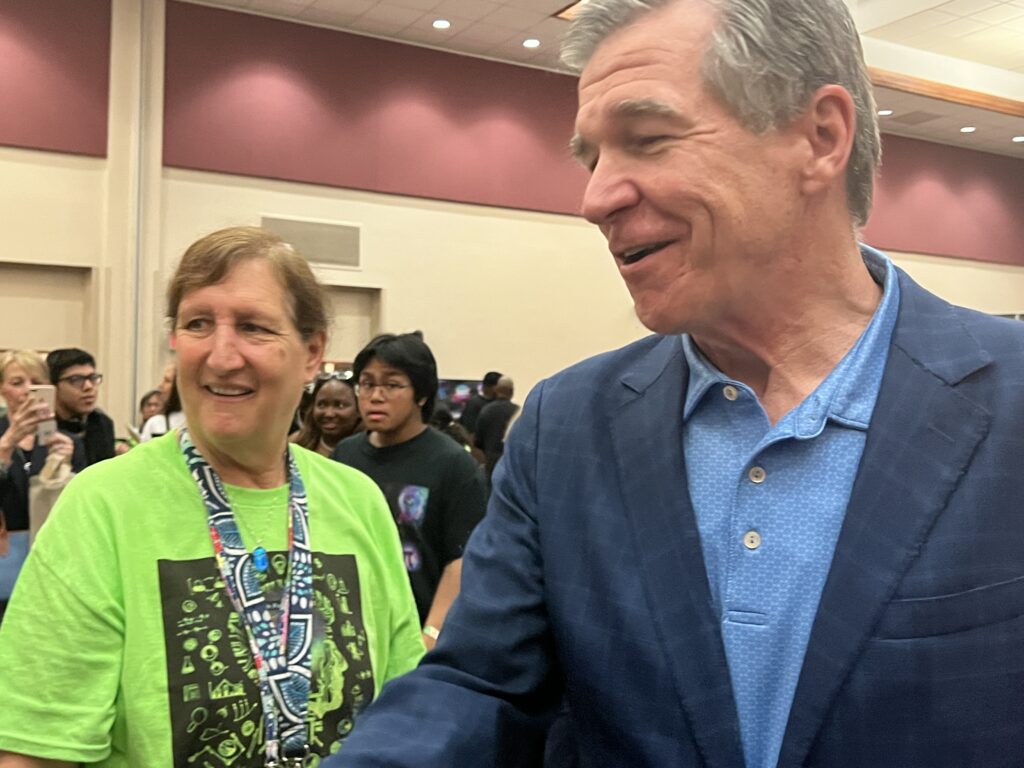
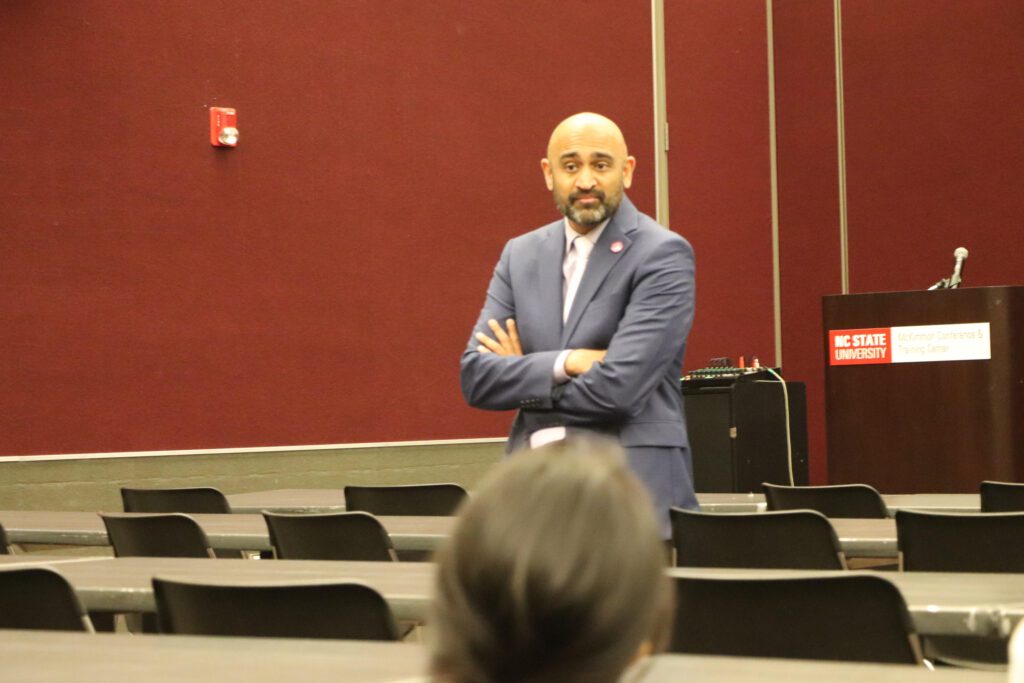

Among the event’s keynote speakers was EdNC’s own Rupen Fofaria. He spoke about the importance of advocating for students with learning differences and giving them a platform for their voices to be heard.
“I try to avoid sweeping declarations. I’ve heard from parents who have trouble with educators during (Individualized Education Programs) meetings. It needs to be resolved. But I’ve also talked to so many educators who want to do better but are stuck in a broken and underfunded special education system. It’s a system that recognizes students with learning differences in words — but often not in action. The governor’s here today. There are U.S. and state legislators here today. Make your voices heard. Visit the General Assembly. Tell your stories.”
Rupen Fofaria, equity and learning differences reporter at EdNC
Bring your legislator to school day
The purpose of organizing robust education advocacy efforts in Raleigh is to bring policy issues present in the classroom that may be unfamiliar to legislators right to their doorstep. But another way to familiarize legislators with relevant education policy issues is by inviting them into the classroom.
That is exactly what the inaugural Bring Your Legislator to School Day, happening on May 15, is all about. The initiative is a joint effort between N.C. Regional Teachers of the Year and Principals of the Year, the Public School Forum of North Carolina, and a multitude of legislative co-sponsors.
Talking to teachers, principals, and students directly shows legislators first-hand the impacts of their decisions. The hope is that experiencing a day in the classroom and seeing the needs of K-12 students across the state will allow them to make informed choices when they are voting on legislation in the future.
Below is a list of all of the House and Senate members who have already accepted their invitation to step into the classroom and experience a day as a North Carolina student.
Higher education legislation
Higher education has also been a focal point of education bills introduced this legislative session. Issue areas range from college tuition fairness for undocumented students to strengthening local and state support for historically Black colleges and universities (HBCUs).
Below is a look at the different groups that have made concerted efforts to gain a listening ear from local legislators on the wide variety of issues impacting postsecondary education this legislative session.
Tuition fairness for all
Senate Bill 706, titled “In-State Tuition Equity,” was filed on April 6. The bill would expand opportunities for undocumented students to qualify for in-state tuition at UNC institutions and community colleges if they attended school within the state for two consecutive years before high school and then graduated from a North Carolina high school.
Just a week after the bill was filed, over 50 student activists from across the state gathered in front of the legislature to advocate for tuition fairness for undocumented students.
Giselle Quijada, a recent graduate from Meredith College, shared her grievances as a first-generation undocumented student. Quijada explained how she was able to graduate from Meredith College, but she acknowledged that her story is very rare. She said she wants to advocate for others who aren’t able to overcome the barriers she faced along the way.
“There are many students that are in the same position but may not have the resources I’ve had or the knowledge that I’ve been able to get, and they think that college isn’t attainable for them. And being able to get in-state tuition would make it so much better. And so many doors would feel like they’re flying open for them. And I just know that when I was in that position, there were many tears, a lot of sweat, a lot of hours into that, and I’m hoping there can be a change so they feel that there’s people supporting them and rooting for them.”
Giselle Quijada, first-generation undocumented student
Aylin Sotelo, the advocacy program coordinator at El Vinculo Hispano (The Hispanic Liaison), a nonprofit serving LatinX communities in Chatham, Alamance, Randolph, Lee, and Harnett counties, was also present at the event. Despite having lived in Siler City for 19 years, Sotelo was going to be forced to pay out-of-state tuition in North Carolina on account of her documentation status. Her desire to get a degree convinced her to pack up and attend Delaware State University instead.
“We are here to advocate for tuition fairness on behalf of our younger generations as we in different manners have been affected by out-of-state tuition and different routes we had to take in order to overcome that obstacle that we’ve been facing for several years now. So we’re here to fight that and in hopes that that will be resolved soon, and our younger generations won’t have to face those obstacles and go through that mental state where they have to doubt themselves.”
Aylin Sotelo, advocacy program coordinator at El Vinculo Hispano
Adult learners
Enrollment of adult learners at North Carolina community colleges grew 10% between 2020 and 2022. College leaders attribute some of that growth to the initiatives focused on engaging adult learners throughout the state – including Racial Equity for Adult Credentials in Higher Education (REACH) and N.C. Reconnect.
REACH is charged with increasing credential attainment among Black, Hispanic, and Native American adults by 2% by 2024. Of the 58 community colleges in North Carolina, 24 are involved in REACH. The initiative is supported by the Lumina Foundation and the John M. Belk Endowment.
N.C. Reconnect launched in 2021 with support from the John M. Belk Endowment, the Belk Center for Community College Leadership and Research, myFutureNC, and the North Carolina Community College System (NCCCS). The program focuses on reaching adults who have earned some college credit but never completed a credential and are currently not enrolled in college.
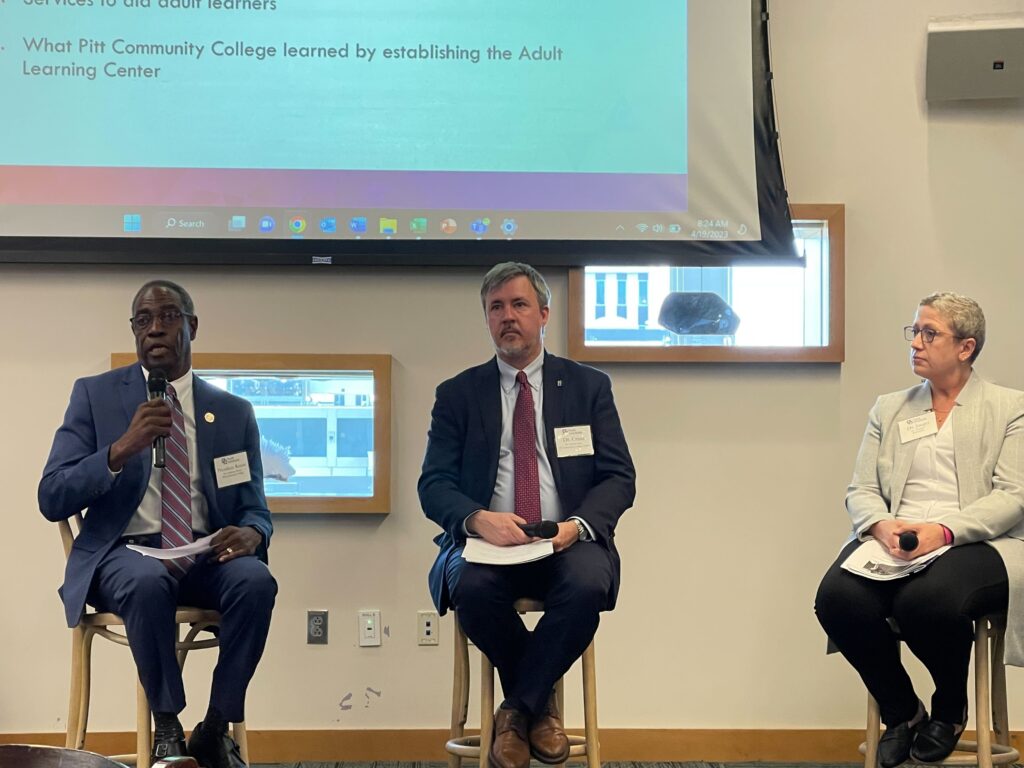
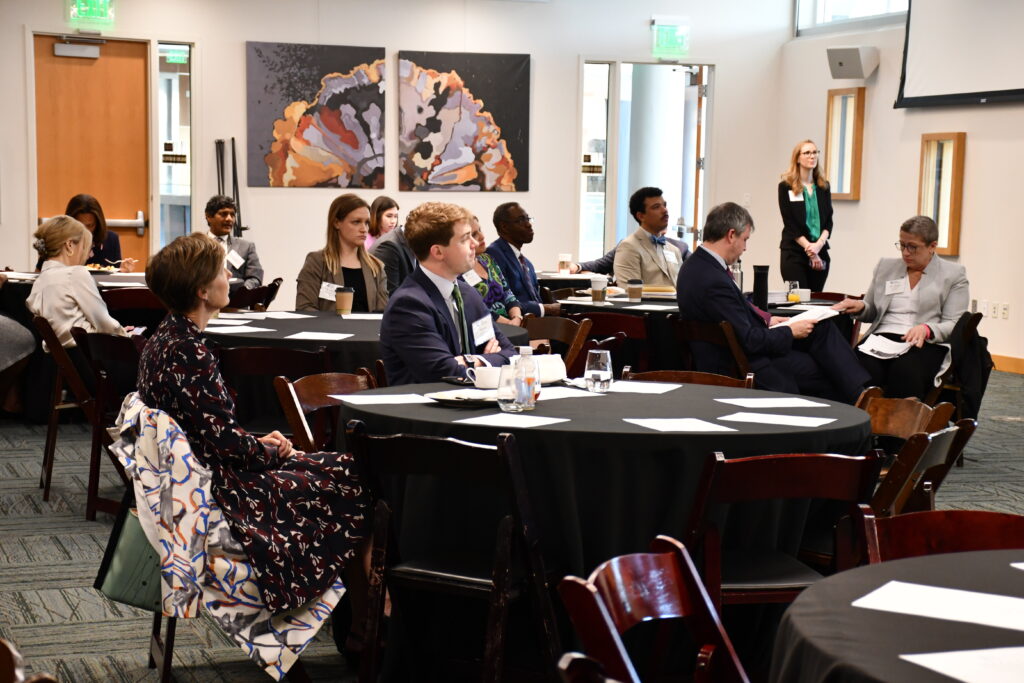
In late April, the Hunt Institute convened legislators and stakeholders to discuss the outcomes of these existing initiatives and the steps ahead to continue to support adult learners across North Carolina community colleges.
Dr. Patrick Crane, vice president of strategic initiatives for NCCCS, started the convening with a presentation highlighting the 28,690 new jobs in North Carolina announced by Gov. Roy Cooper in 2022. The jobs, which represent 182 business recruitment, expansion, or rural development projects, will bring $19.3 billion of capital investment into the state, Crane said.
Those jobs will need skilled and trained individuals, an area that community colleges are primed to tackle.
“Adult learners provide a unique opportunity for North Carolina to reimagine postsecondary pathways to meet our attainment goal, and most importantly, meet our workforce needs,” said Dr. Madeline Smith, director of higher education at the Hunt Institute. “Providing a space for legislators and higher education leaders to engage with one another fosters a greater alignment and collaboration to advance postsecondary policy.”
Supporting the NC10
On April 19, members of North Carolina’s 10 accredited historically Black colleges and universities (HBCUs), referred to as the NC10, met with state senators and representatives for a legislative day and addressed the legislature’s bipartisan, bicameral HBCU caucus.
The caucus was formed this legislative session and presents a prime opportunity to expand state efforts to support HBCUs. This was the first visit to the legislature by leaders of all 10 HBCUs since the NC10 began meeting in April 2021.
More than a dozen legislators attended to hear representatives from the NC10 talk about legislative needs, which largely focused on funding. As the state with the most four-year HBCUs in the nation, legislators spoke about the importance of leveraging these institutions for a brighter future.
Rep. Zack Hawkins, D-Durham, and then-Sen. Bob Steinburg, R-Chowan, issued an important reminder together back in November 2021, speaking to the NC10 but about education advocacy overall.
“Advocacy is job number 1,” said Steinburg. “Having relationships is paramount.”
It is clear that this legislative session, advocacy is at the top of the list for the NC10. And the formation of the HBCU caucus has helped the state get closer to fortifying existing relationships with the NC10.
For more information on the specific legislative asks being made by the NC10, see the articles below.
Recommended readings
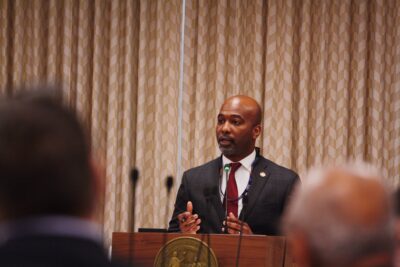
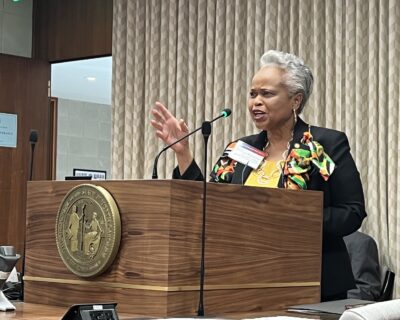
Tools to be an effective education advocate

At the start of the legislative session, EdNC gathered all of the resources needed to be an effective advocate for education, including an introduction to the functions and powers of our state government. You can find that information here.
After Rep. Cotham’s party switch, EdNC released a two-part series evaluating the implications the shift in political power could have on education. The first article in the series explores the impact of the Republican’s newly-acquired supermajority, the details of the education bills filed so far, and the questions that have been raised.
The second article of the series reevaluates the tools needed to be an effective education advocate given the Republican supermajority.
Your voice matters, and we hope that this legislative session you will let it be heard.
Editor’s Note: Liz Bell, Katie Dukes, Rupen Fofaria, Hutch Whitman, Mebane Rash, and Emily Thomas contributed reporting to this article.
Recommended reading

